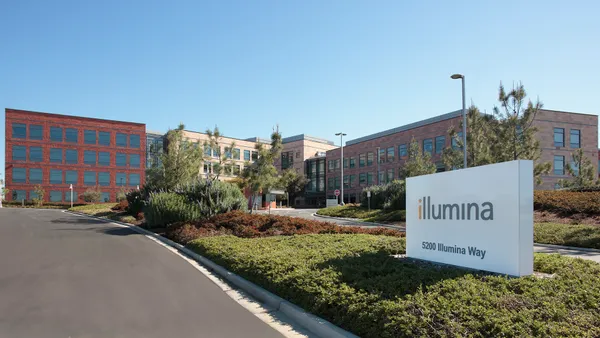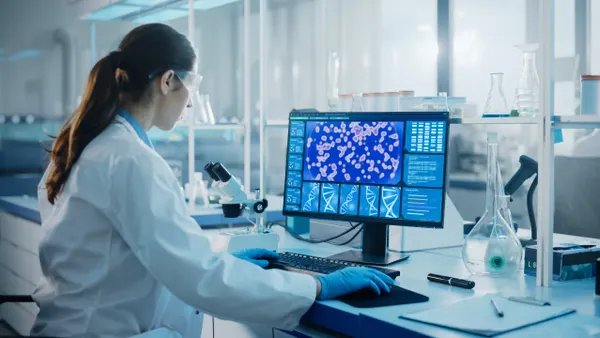Dive Brief:
-
Freenome has raised $270 million to generate the clinical data the San Francisco-based biotechnology company needs to bring its colorectal cancer blood test to market.
-
The financing round disclosed Wednesday comes shortly after the start of a 14,000-subject clinical trial that could set the startup up to compete with Exact Sciences and Guardant Health for the colorectal cancer screening market.
-
Freenome’s aspirations extend beyond colorectal cancer. Using technology to detect tumor DNA and immune responses to cancer cells, the company contends it can diagnose diseases earlier than rivals in the liquid biopsy space.
Dive Insight:
Freenome emerged in 2016 with a small amount of money from well-known tech investors including Andreessen Horowitz and Founders Fund. Since then, the company has raised a succession of larger rounds, setting it up to start a FDA registrational study for its colorectal cancer screening test in May.
The latest financing, which brings Freenome’s total haul to more than $500 million, will support acceleration of the registrational study. With COVID-19 disrupting colonoscopies, the established way of screening for colorectal cancer, Freenome has expanded access to the trial to cover “nearly any zip code.” The company is using “virtual tools” to enable people to participate in the trial without traveling to dedicated clinical trial sites. The estimated study completion date is still listed as July 2021.
The trial is designed to assess the sensitivity and specificity of its machine learning-based analysis of cell-free biomarkers in the detection of colorectal cancer. Subjects will undergo a blood test followed by a colonoscopy to show how Freenome’s approach compares to the standard of care.
The focus on colorectal cancer puts Freenome up against Exact Sciences and Guardant Health. Exact’s stool-based diagnostic Cologuard is the incumbent noninvasive colon cancer screening test. Guardant is putting its financial resources behind an experimental liquid biopsy rival to Cologuard.
Freenome contends its technology is better equipped to detect cancers early. Guardant looks for genetic and epigenetic signatures indicative of colorectal cancer in blood samples. Freenome argues that focus on circulating tumor DNA may not detect disease early, when cancers are shedding relatively small amounts of DNA and proteins into the blood.
Freenome looks for both cell-free immune DNA signatures and tumor markers. The dual approach reflects evidence that the immune system identifies cancer cells early in the development of a tumor. If Freenome can detect the changes that happen when immune cells first detect tumor cells, it may be able to diagnose cancers before they grow and spread.
The focus on immune cells, in addition to tumor markers, differentiates Freenome from Guardant and other liquid biopsy companies including Illumina-spinout Grail and Thrive Earlier Detection.
Grail established itself as one of the biggest names in the space by raising close to $2 billion across four financing rounds. Guardant raised more than $500 million as a private company before adding a further $238 million in an IPO. Thrive, which was only founded in 2019, announced itself as an emerging player by raising $367 million in a little over 12 months.
Freenome has an investor syndicate with the resources to provide ongoing financial support. Bain Capital Life Sciences, one of the best-resourced investors in the industry, co-led the round with Perceptive Advisors. A long list of big-name financial and strategic investors including Fidelity Management & Research Company, Novartis and Roche Venture Fund also participated.











